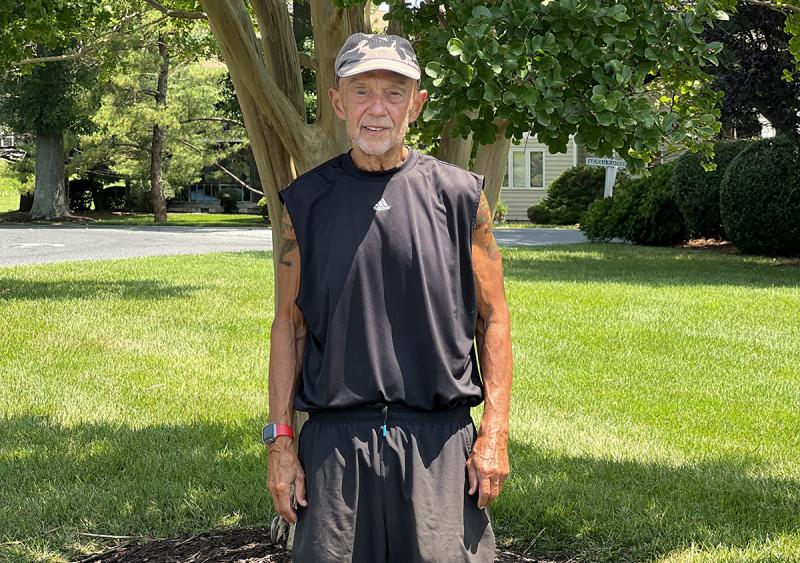Retired Army Col. Jerry Lechliter has made it his mission to fight for veterans. The self-taught lawyer, who has lived in Lewes since he retired in 1999, navigates a complex, bureaucratic system so active-duty soldiers and veterans receive disability compensation they earned from the Army and Department of Veterans Affairs, respectively. This vocation comes after a long career in the military, where he served as an enlisted Marine and Army officer.
Born in Philadelphia in 1943, Lechliter's family moved to Wildwood, N.J., when he was 10 years old. After high school, he attended a small college and studied the Russian language. This exposure played a huge role in his future endeavors.
Upon graduation in 1967, he served in the Marine Corps and completed almost two years of active duty, earning the rank of sergeant. After he left the Marine Corps in 1969, he decided to study Russian instead of attending law school, and he earned an advanced degree in Russian and Slavic linguistics at the University of Pittsburgh.
In 1973, he went to Army Ranger School and was commissioned as a second lieutenant. He entered active duty in 1974, and his first assignment was in Berlin, Germany, where he met his future wife in 1976. After the failure of Operation Eagle Claw-79 to rescue the Iranian-held American hostages in April 1980, his commander assigned him to the First Ranger Battalion to provide specialized intelligence support for any future operation. Subsequently, the Army trained him as a specialist in the Soviet Union and Eastern Europe because of his skill in Russian and German.
More specifically, he was a Russian foreign area officer and served as a military intelligence officer. His advanced language skills also led him to an assignment as a presidential translator for two years at the Washington-Moscow Hotline, which was created in 1963 after the Cuban Missile Crisis so heads of state could communicate directly to reduce tensions and avoid a nuclear conflagration. He later returned to head the unit for more than two years. In his last assignment, he served as the director of a U.S.-German classified unit in Germany.
Like most veterans, he sought VA disability compensation, a statutory entitlement for veterans who suffer a disability incurred while on active duty. After encountering a VA bureaucratic maze, Lechliter became interested not only helping himself, but also other active-duty soldiers and veterans.
It took 18 years for Lechliter to receive VA benefits for one disability. It took two court decisions and agency appeals for the VA to get it right. He experienced frustration with the VA bureaucracy that many veterans across the country experience. It was then that he decided to help active-duty soldiers and veterans gain the benefits the nation owes them.
He is not a licensed attorney, but he is able to represent veterans in the U.S. Court of Appeals for Veterans Claims, the only appellate court where a veterans' representative does not have to be a licensed attorney.
Currently, Lechliter is helping a Delaware veteran from Camden who served three combat tours as a Ranger. The VA initially denied the veteran benefits for post-traumatic stress disorder and traumatic brain injury claims. Through Lechliter's help, the veteran was able to get even more compensation than he initially sought.
The military disability retirement and VA disability compensation systems are extremely complicated, and Lechliter fights for soldiers and veterans so they are treated fairly and get the lawful compensation they have earned. Many mistakes can be made along the way. Disability ratings are determined by physical exams. Lechliter said many of these exams are inadequate, especially for active-duty soldiers, because the Army does not provide VA medical examiners with soldiers' job requirements. Today, VA contract medical examiners, instead of VA physicians, conduct most of these exams: they often do not understand the rigors of military service and combat.
“A physician cannot conduct a fit-for-duty examination for a soldier if he or she doesn't know the specifics of a soldier's duties,” Lechliter said.
One of Lechliter’s clients, after serving three tours in Iraq in the 82nd Airborne Division, faced the brute end of this reality. His examiners, who had no idea what a combat recon scout's duties comprise, found that multiple musculoskeletal injuries did not affect the client’s ability to do his job. With Lechliter's help, the client had a positive outcome through multiple appeals and a court decision. He now receives lifetime retirement benefits with free medical care.
Most of Lechliter's clients come from a group of about 7,000 veterans who are self-represented. These veterans are people who either cannot afford or do not have time to contact an attorney. Many wind up on what is commonly referred to as “the hamster wheel of VA adjudication,” a years-long process of appealing claims. The court, instead of correcting errors, sends the case back to the VA to correct them, resulting in the wheel’s endless revolution, as Lechliter experienced for 18 years. The VA also won’t give remote access to read-only electronic claims files to self-represented veterans, as it does to veterans representatives, which adds to the difficulty of pursuing claims, Lechliter said. It's not hard to see why most veterans give up, he said.
“Delay, delay and let them die” is the title of a law journal article Lechliter said best represents the VA process. He said there are clearly many systemic flaws, and the VA bureaucracy many times is plagued by the three deadly Is: indifference, incompetence and indolence. It’s the work of people like Lechliter who keep the hope of justice alive for veterans and soldiers.
He speaks of a college professor who influenced his journey by shining a light on essentials for success: competence in analytical and critical thinking, writing and public speaking.
“Become involved, do some good [and] don't be self-centered,” he said. “Life isn't just about yourself; you're in a community, [so] try to help the community. We are too self-centered and ideological. I have been around 80 years, so I have seen a lot of changes.”



















































